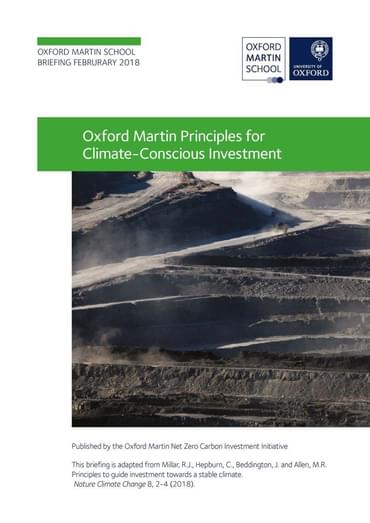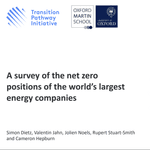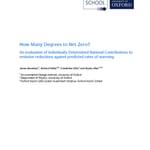The Oxford Martin
Net Zero Carbon Investment Initiative
The Oxford Martin Net Zero Carbon Investment Initiative was established in 2015 and ended in 2021. This page is an archived resource. Programme Directors, Professor Myles Allen and Professor Cameron Hepburn remain involved with several other Oxford Martin School programmes and the Oxford Martin Principles for Climate-Conscious Investment have been taken forwards by Oxford Net Zero.
Shifting the dial on money’s climate impact
You can’t buy your way out of a climate crisis without addressing the root cause.
Climate change poses significant financial challenges for markets, asset values and shareholders. It also gives investors and shareholders an ethical conundrum - should they divest from fossil fuels?
The Oxford Martin Net Zero Carbon Investment Initiative, which ran from 2015 to 2021, was established to answer these questions, and to help investors accelerate the transition to a zero carbon economy.
By the close of the programme it had influenced the strategies of investment management companies and institutional investors that control a combined £62.5 billion (as of November 2020).
How did they do it? Read more about the initiative and its impactthe challenge
Stabilising global temperatures and avoiding dangerous changes in the climate requires net carbon dioxide emissions to be reduced to zero. Getting to zero emissions will require dramatic changes in investments and in energy systems, which carry their own risks.
The transition to a safe climate future is all the more challenging because existing fossil carbon reserves, owned by public or private investors, likely already vastly exceed the amount that can be used if we are to meet the internationally-agreed goal of keeping global temperatures of well below 2ºC.
Investments in infrastructure, both in the energy sector and the broader economy, risk “locking in” emissions that exceed a safe cumulative total. How should investors respond?
Many are already attempting to divest from coal or from all extractive fossil fuel operations. There is considerable interest in “low-carbon” investment opportunities, but less clarity on the longer-term question of how investment can provide a route to a zero carbon economy. Some argue that what is needed is active engagement with the fossil fuel industry and that divestment only will not bring the required changes as long as the world economy remains overwhelmingly fuelled by fossil energy. Academics from the Universities of Oxford, Harvard and Columbia are consulting with the scientific and investment communities in combination with fossil fuel industry stakeholders to address the issues involved.
This Initiative aims to address a number of specific questions:
- How do investment strategies impact on committed cumulative carbon emissions?
- How can progress be measured to ensure a company or investment portfolio is on track to reach net zero carbon emissions before mean temperatures increase by 2°C?
- What role does investment in carbon capture and storage (CCS) play in the solution?
- What are the wider implications of investment strategies for the current and future ownership of fossil fuel assets?
The Oxford Martin Net-Zero Carbon Investment Initiative has been working closely with leading international governance initiatives on corporate carbon and climate risk disclosure, including the Financial Stability Board's Task Force of Climate-related Financial Disclosures (TCFD), and remains focused on embedding sound climate science within such international frameworks.
In February 2018 the programme launched The Oxford Martin Principles for Climate-Conscious Investment. Shortly after, following advocacy by the College’s undergraduate body, St Hilda’s College (University of Oxford) rewrote its investment policy and became the first institution to adopt the Principles as a framework to shape its investment decision-making. Specialist asset manager, Sarasin & Partners, have also implemented the Principles to guide their new Climate Active Endowment Fund.
The Oxford Martin Principles for Climate-Conscious Investment
Faced with climate change today, companies and investors face many complex ethical questions. Should investors continue to invest in fossil fuels? How should investors manage the legal and financial risks of the internationally-agreed transition to net-zero emissions?
In response to a very different moral dilemma in the 1970s, the Sullivan Principles were developed to help investors and companies by providing a practical set of guidelines on how to engage with businesses in the South African apartheid regime.
A new set of principles are needed to address the moral challenge of climate change. These are the Oxford Martin Principles for Climate-Conscious Investment developed by the Oxford Martin Net Zero Carbon Investment Initiative.
The principles, published in Nature Climate Change, are as follows:
1. Commit to reaching net zero emissions from their business activities
2. Develop a plausible and profitable net zero business model
3. Set out quantitative mid-term targets compatible with their net zero goals
The Oxford Martin Principles were also used by activist group Market Forces as a framework to analyse energy planning in Australia in their report Business as Usual: Australian companies not planning for climate change.

videos
Prof Cameron Hepburn, Sugandha Srivastav and Dr Steve Smith in conversation: "Sensitive intervention points for Net Zero"
Prof Myles Allen, Kaya Axelsson, Prof Sam Fankhauser & Dr Steve Smith in conversation: "Net zero – why and how?"
"Cumulative emissions of carbon - a path to halting climate change?" with Dr Joeri Rogelj
"Planetary warming: is a 1.5 degree target achievable?" with Prof Myles Allen
The Carbon Debate 2018
Measuring progress towards the Paris Agreement: aligning policy and science in global stocktakes
"Our shared world: reconciling individual need and collective responsibility" - Panel Discussion
news
View allNew Year's Honour for Professor Myles Allen
Professor Myles Allen has been named among seven members of the University of Oxford who have been recognised for their outstanding achievements in the New Year's Honours list for 2022.
Making fossil fuel extractors clean up after themselves is affordable and low-risk
Imagine a single policy, imposed on one industry, which would, if enforced consistently, stop fossil fuels causing global warming within a generation.
New College adopts the Oxford Martin Principles for Climate-Conscious Investment
New College, Oxford, has adopted a Responsible Investment Policy that incorporates the Oxford Martin Principles for Climate-Conscious Investment, one year ahead of the COP26 Conference, which will take place Glasgow next November.
Oxford Net Zero launches to tackle global carbon emissions
The Oxford Net Zero initiative draws on the university’s world-leading expertise in climate science and policy, addressing the critical issue of how to reach global ‘net zero’ – limiting greenhouse gases – in time to halt global warming.
publications

A survey of the net zero positions of the world’s largest energy companies

Fossil Fuel Divestment and Engagement on Climate Change: advice for investors

Science-based or scenario-based? Corporate investment for a stable climate

Oxford Martin Principles for Climate-Conscious Investment

Principles to guide investment towards a stable climate

Can we hold global temperatures to 1.5ºC?

Working Principles for Investment in Fossil Fuels

How many degrees to net zero?
Keep in touch
If you found this page useful, sign up to our monthly digest of the latest news and events
Subscribe